Human Rights Policy
At Dabur, we are committed to the principles of sustainable development including protecting and respecting human dignity. We conduct our business in a fair and equitable manner, meeting our social responsibilities as a direct and indirect employer and we will respect the human rights of all our stakeholders.
Our Human Rights Policy applies to all Dabur employees and workers including trainees, part-time and contractual workforce across our business units, entities we own and entities in which we own a majority interest. This policy extends to our value chain partners also. Our Chief Human Resources Officer & Head of Operations are jointly responsible for Dabur’s Human Rights Policy. Board level oversight is provided by Risk Management Committee of Dabur.
Dabur will:
- Be compliant with labour laws of the country in which we operate and ensure that our employees (including part-time) and contractors are statutorily paid, and the remuneration structure is compliant with statutory obligations of the jurisdictions in which we operate, including but not limited to 48 hours per week normal working in line with ILO convention, minimum wages, leave benefits, and overtime compensation.
- Promote safe and fair working conditions for all employees, including differently abled individuals, and uphold human rights aligned with national regulations and international expectations and conventions.
- Include human rights-related requirements within contractual arrangements with vendors, suppliers, and value chain partners, in line with our Supplier Code of Conduct (https://www.dabur.com/sites/default/files/2023-05/Board-Approved-SCOC.pdf).
- Have zero tolerance for any form of forced, compulsory, or child labor and sexual harassment, either directly or through contracted labor.
- We are committed to identifying human rights-related risks covering child labor, forced labor, human trafficking, and discrimination within our operations and extended value chain, and developing a mitigation plan for the same. Our risk identification process goes beyond our employees, covering vulnerable groups, including but not limited to local communities, women, and children.
- Be an equal opportunity employer and treat all employees with respect and dignity. All employees are judged solely on their performance irrespective of their race, religion, caste, gender, sexual orientation, age, or disability; therefore, ensuring no discrimination in recruitment, remuneration, and promotion.
- Respect and preserve the culture and heritage of local communities, including socially vulnerable groups that may be impacted by our operations and work towards developing a constructive relationship with such groups.
- Work closely with our stakeholders, employees, Contractuals, government agencies, civil society organizations, experts, suppliers, business partners, industry and communities to strengthen our approach to managing and addressing human rights.
- Continue to communicate this policy and raise awareness and knowledge amongst our employees and partners. We offer specific training on human rights related matters to our employees and partners.
Redressal
We place importance on the provision of effective remedy wherever human rights impacts occur through company-based grievance mechanisms. Our Code of Ethics & Conduct and Direct Touch (whistle-blower policy) provide a platform to our employees and individuals in the extended supply chain to report any violations, and encourage them to voice any concerns they may have, without fear of reprisal.









 View PDF
View PDF